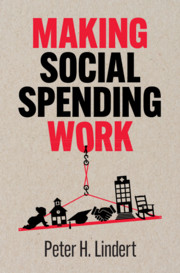Book contents
- Making Social Spending Work
- Making Social Spending Work
- Copyright page
- Dedication
- Contents
- Figures
- Tables
- Appendices
- Part I Overview
- Part II The Long Rise, and Its Causes
- Chapter 3 Why Poor Relief Arrived So Late
- Chapter 4 The Dawn of Mass Schooling before 1914
- Chapter 5 Public Education since 1914
- Chapter 6 More, but Different, Social Spending in Rich Countries since 1914
- Chapter 7 Is the Rest of the World Following a Different Path?
- Part III What Effects?
- Part IV Confronting Threats
- Acknowledgments
- Notes
- References
- Index
Chapter 4 - The Dawn of Mass Schooling before 1914
from Part II - The Long Rise, and Its Causes
Published online by Cambridge University Press: 01 April 2021
- Making Social Spending Work
- Making Social Spending Work
- Copyright page
- Dedication
- Contents
- Figures
- Tables
- Appendices
- Part I Overview
- Part II The Long Rise, and Its Causes
- Chapter 3 Why Poor Relief Arrived So Late
- Chapter 4 The Dawn of Mass Schooling before 1914
- Chapter 5 Public Education since 1914
- Chapter 6 More, but Different, Social Spending in Rich Countries since 1914
- Chapter 7 Is the Rest of the World Following a Different Path?
- Part III What Effects?
- Part IV Confronting Threats
- Acknowledgments
- Notes
- References
- Index
Summary
No country has ever delivered primary and secondary education to the majority of its children without financing it mainly through taxes. In the eighteenth century and part of the nineteenth, the leading countries passed up chances to capture the gains from public schooling of the masses. In Britain and the Netherlands, the payoffs from basic schooling already promised high rates of return, privately and socially, partly by interacting with the rise of commerce. Yet these two leaders delayed for at least a century and a half, partly because of church-school issues and more fundamentally because those with political voice resisted paying taxes to educate the children of others.
Keywords
- Type
- Chapter
- Information
- Making Social Spending Work , pp. 48 - 62Publisher: Cambridge University PressPrint publication year: 2021

